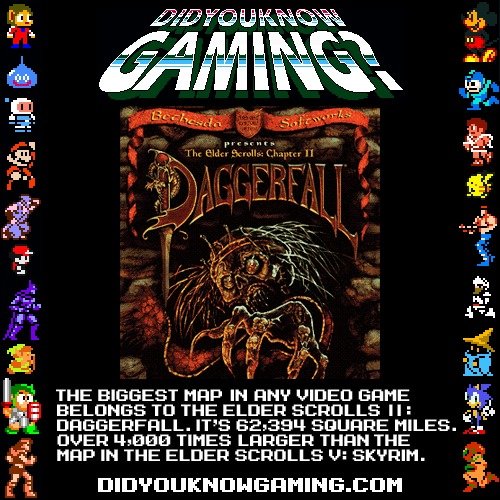My first rpg was Ultima 3 and I remember every Ultima game as they came out, offered something new until Ultima 8, where the series ultimately (npi) fell apart. For years after, I compared every rpg to Ultima 4,5,6, and 7, allowing nostalgia to dictate both my feelings about those games and the new games trying to win me over. Long story short, two years ago I went and replayed the entire Ultima series and realized that nostalgia was a heck of a drug. While revolutionary at the time of release, the games did not hold up as experiences beyond the story concepts explored after Ultima 4 pulled the series above "go kill the evil wizard, because evil stuff".
For a long time I treated the Elder Scrolls series the same way. I never looked at Arena and Daggerfall as having much to offer beyond the shock and awe of big numbers, world size, number of dungeons, etc. But those numbers were largely meaningless as these games were wide as an ocean and deep as a puddle, as the saying goes. Morrowind was the first game since Ultima 5 to have interactive objects, realistic npc conversations, day and night npc schedules, etc, that made me feel like I was seeing a generational leap in rpg gaming. I felt the same way about Oblivion when I walked out of the sewers of Imperial City for the first time and when I emerged from that cave after Skyrim's opening. Unlike many old school fans, I thought the series got better in the most important ways while losing a couple systems that I didn't use much anyway, spellmaking, and the crazy magic enchanting systems. Year after year I found that wearing Morrowind fandom was some sort of odd badge of honor for my generation and I simply didn't understand it, so I went back last August, to give it another go, just like I did with the Ultima series a couple years prior and I almost actively disliked the experience.
1. The Setting. It replaces some of the trees with mushrooms and the architecture, in some parts, is mildly alien. This isn't some exotic land the likes of which we have never seen, it is fairly standard fantasy with some oddities thrown in to make players feel a little off. a trick that films like to play by sometimes showing images that contradict other scenes in terms of time period, season, etc. I liked the environment, but it certainly wasn't mind blowing. Console constrictions, and even the limits of the times PC hardware, definitely forced design decisions that were less than ideal. Vivec looks very impressive from the outside, but is little more than a confusing maze of locations without any real sense of place and little to do despite its size. It certainly looked nothing like the early screenshots which showed an open air city teeming with activity and airships flying above, and nothing like the promotional materials showing massive slave camps being liberated and enemies on insect mounts both grounded and flying. The dungeons, as mentioned were very tiny and linear with little opportunity to avoid combat with a stealthy character, talk your way past guards, or any of the other things that were certainly possible at the time.
2. The NPC's. They can discuss a lot of topics, the problem is that they are, with rare quest related exception, the same lines of dialogue over and over and I found myself clicking through all of them anyway every single time on the off chance that I might be missing some new quest, or clue. They largely stay in the same place, and really don't interact with each other or the environment, making even the largest cities and structures feel lifeless. For all the credit the npcs get, they are in many ways a step back to pre-Ultima 5 times, and I couldn't name a single interesting or memorable npc having just finished the game and its expansions in early November 2017. In many ways, Oblivion took an even larger step backwards with the silly influence mini-game, but it says quite a bit when I can remember and fondly recall more NPC's in Skyrims Riverwood than I can the previous 4 games in the series in total.
3. The Story. Stop evil mad god thing, fulfill prophecy, yadda yadda. Some of the names are hard to pronounce and they call zombies something different, but there is nothing new to see here. Standard fantasy rpg gibberish the industry has never seemed to be able to improve on with the incredibly rare exception (Ultima 4 is the only game that comes to mind in this regard.)
4. The Combat. This is the great divider imho. Some people want the chance they hit something in combat dictated by stats, some people want to swing a sword and if it hits, it hits. I'm very much on the side of fans that absolutely loathe the combat in Morrowind. Some make the argument that your characters stats should decide if a sword strikes, not the players ability. This is a false argument. I may be lousy at sword play, but as a functioning human being, I can still swing a sword at something two feet from me and hit it with 100% accuracy. Now if you want my strength, or my skill with a sword to adjust how much damage I do, or possibly lead to things like me dropping my weapon or staggering my foe, then I'm all ears. If you tell me that even someone that has never swung a sword can't hit something right in front of their face with it, I'm calling bs. Combat was one aspect of the game where I believe the series has improved with each iteration. It still could use some depth, but since combat is what we do in most rpgs most of the time, I only got tired of Skyrims combat once I had become too munchkin to find a real challenge.
5. Exploration. They nailed it, but they always nail it. Nobody creates better open worlds than Bethesda and even though there have been missteps in recent games like the voiced protagonist in Fallout 4 and the ability to run all factions in Skyrim, the bottom line is there isn't much in gaming that gets me more excited than getting past the opening sequence of a Bethesda rpg and knowing that I will have hundreds of hours of wonderful places to explore and experience. Far more than the stories, or the characters, I find I remember almost every inch of these places they create as if they were old homes.
6. The Systems. Oddly both a strength and a weakness for the game and the series. I'll never understand why I can't climb up onto a roof, or mantle across a ledge. All you can really do to interact with the environment is the annoying jump climb thing up the side of mountains you're weren't meant to climb, and click "e" to interact. Even in 2017 the odd little Creation Engine Bethesda uses still doesn't have such advanced technology as ladders and mirrors, yet I can summon vertibirds and construct a city from scratch. The one thing I will agree with critics of later ES games is that I have no idea why they took out spellmaking and the odd magic enchanting. Sure it can break the game, but that is easy to avoid by not allowing some game breaking enchantments until after the conclusion of the main story. Tell us the story and then let us go nuts. I understand that games have a limited dev time and resources need to be allocated and prioritized for balance, but they really should have taken the time, or spent the money to bring one or two people in to balance and keep these features.
7. Conclusion. The first few hours were awkward, like bumping into an old girlfriend you were really into and now you just don't have anything in common and you just want the conversation to end and move on. By the time it was over, I was so tired of the experience that I didn't play another game until late January of this year. The combat was awful, the npc's were lifeless, the quests were all over the place with most still being FedEx style delivery snoozefests, the world was interesting, but nowhere near as exotic as I remembered. For every insect hut and giant mushroom was a standard swamp, a dense forest and a medieval looking castle. Certainly it deserves its place in rpg history. It really was the closest gaming had come to giving us a real living fantasy world to explore upon release, so in terms of it's historical significance I would agree that it is a top 5 rpg. I would still put Ultima 4 at number one, but my top 5 remain solid (Ultima 4, Morrowind, Deus Ex, Fallout 2, and Fallout New Vegas) even if their positions may change from time to time. In terms of it being a game worth playing today, I would say only for the patient or those that think Skywind will never actually release, and it isn't just the game's age. I still love to play Fallout 2 every couple years and it is buggy and clunky as can be, but it is still a fun "game" even if the tech is horribly dated. I can honestly say that with the rare exception, I just didn't have much fun with Morrowind. This will likely be my last experience with the original Morrowind and I'm glad I did it. As a guy that turns 40 in November, I'm getting to that point where it's too easy for me to say that things were better in my day, that they just don't make em like they used to, but I know that's a load of crap, the world isn't getting worse, I'm just getting old, and replaying some of these things I loved dearly in my youth and by approaching them honestly keeps me grounded and makes me realize that while the past has it's place, it can't be glorified at the cost of reality and the reality is that we are getting the most amazing game worlds now and will get even more amazing game worlds in the future. There will be mistakes, cough Fallout 4 cough, but at the end of the day, the envelope keeps getting pushed and I envy the kids today that are in elementary school and booting up there computer for the first time to play Skyrim or the Witcher 3. I just hope those kids never lose their sense of wonder at the future by getting stuck in the past, because they are going to see things in gaming that we can't even imagine and I hope they embrace them.


























![Have Many Potato [2013] Codex 2013](/forums/smiles/campaign_tags/campaign_potato2013.png)
![The Year of Incline [2014] Codex 2014](/forums/smiles/campaign_tags/campaign_incline2014.png)














